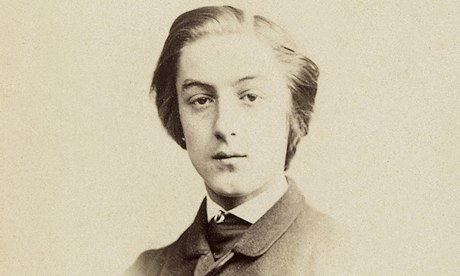The young writer's version of the classical lyric poet is inflected with the eccentric innovation that marked his own work

A singular sound … Gerard Manley Hopkins photographed by George Giberne, printed by Hills and Saunders. Photograph: National Portrait Gallery
Besides the dazzling original poetry for which he's celebrated, Gerard Manley Hopkins produced a small number of translations from the Greek and Latin poets. This week's poem, "Persicos odi…", is one of his two Horace translations. It was written early in his career when, after leaving Oxford in 1867 with a double-first in Classics, he spent a semester teaching at Newman's Oratory School, Birmingham. "Persicos odi…" (Book 1:38) is a remarkably textured little lyric. Despite its formality, the poem has a soundscape full of characteristic Hopkins timbres.
That fatherly, even priestly, apostrophe ("Ah child") initially sounds a rather stifled Victorian note. Hopkins's "child" is less casual and more neutral than Horace's "puer" and lacks the sexual undertone which might be inferred from the original. Hopkins's seriousness of purpose is evident, too, in his choice of the word "art" to translate "apparatus", rather than the more usual "ostentation". Despite this so far sedate linguistic palate, he pulls off a lovely surprise with the coined compound-adjective, "Persian-perfect". The homonymic "per" of the first syllable of both words intensifies their trochaic mirroring, and evokes the entwined patterning of a tile or carpet, reminding us, ironically, how beautiful and logical Persian art may be. The rhyme scheme has a similar effect: Hopkins picks an ABAB pattern, but the A and B rhymes in both verses are so similar that the sounds seem to coil around each other.
The alliterative show goes on with "Crowns composite and braided bast". Hopkins seems to be emotionally entangled with these images, so intrigued, in fact, that he separates the "coronas" from the "bast" (which threads them into a garland) and then folksily repeats the subject of his sentence in line two with the pronoun "They".
More
That fatherly, even priestly, apostrophe ("Ah child") initially sounds a rather stifled Victorian note. Hopkins's "child" is less casual and more neutral than Horace's "puer" and lacks the sexual undertone which might be inferred from the original. Hopkins's seriousness of purpose is evident, too, in his choice of the word "art" to translate "apparatus", rather than the more usual "ostentation". Despite this so far sedate linguistic palate, he pulls off a lovely surprise with the coined compound-adjective, "Persian-perfect". The homonymic "per" of the first syllable of both words intensifies their trochaic mirroring, and evokes the entwined patterning of a tile or carpet, reminding us, ironically, how beautiful and logical Persian art may be. The rhyme scheme has a similar effect: Hopkins picks an ABAB pattern, but the A and B rhymes in both verses are so similar that the sounds seem to coil around each other.
The alliterative show goes on with "Crowns composite and braided bast". Hopkins seems to be emotionally entangled with these images, so intrigued, in fact, that he separates the "coronas" from the "bast" (which threads them into a garland) and then folksily repeats the subject of his sentence in line two with the pronoun "They".
More
No comments:
Post a Comment